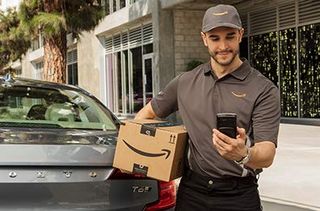Amazon does half of its deliveries in-house, is set to overtake UPS by 2022

What you need to know
- Morgan Stanley estimates Amazon Logistics, the retail giant's in-house shipping solution, is now shipping 2.5 billion packages per year.
- That amounts to 50% of all its deliveries in the U.S.
- The investment bank also estimates that the company may overtake UPS to become the largest shipping service in the country by 2022.
Amazon is rapidly expanding its shipping capabilities, with Morgan Stanley estimating that the company has more than doubled shipments in the U.S. in the last year alone (via CNBC). Its in-house shipping wing now accounts for nearly 50% of all Amazon deliveries in the country this year, up from just 20% last year. To truly understand the scope of Amazon's operation, here's another statistic: the investment bank estimates Amazon is currently shipping at a rate of 2.5 billion packages per year, compared to an estimated 4.7 billion and 3 billion packages per year for UPS and FedEx, respectively.
A large part of this growth is focused on more densely populated urban areas, with Morgan Stanley attributing Amazon's burgeoning rise to its efficient use of technology. "To us, Amazon Logistics is already-large scale and with a fleet ~1/5 the size of competitors, it speaks to its ability to use density and technology to drive efficiency," said the bank.
It also expects Amazon Logistics to become the market leader in the U.S. shipping space in just three more years, accounting for 6.5 billion shipments per year, compared to forecasts of 5 billion and 3.7 billion packages for UPS and FedEx by the same time, respectively.
However, the breakneck pace of Amazon's shipping capabilities has come at a high human cost as we reported earlier in the year. The smaller companies — called delivery service providers — that Amazon depends on for most of its last-mile deliveries report horrific working conditions, which have also led to three fatalities. While Amazon cut its ties with the companies involved in those incidents, it had reportedly begun relationships with new companies working out of the same warehouses and hiring the same workers soon after, raising questions about how many more mishaps might await us in the future as the company nearly triples its shipping volumes in the next three years.
Have you listened to this week's Android Central Podcast?

Every week, the Android Central Podcast brings you the latest tech news, analysis and hot takes, with familiar co-hosts and special guests.
Be an expert in 5 minutes
Get the latest news from Android Central, your trusted companion in the world of Android

